

Can we teach effective listening? An exploratory study. AmbitionInstitute Instructional Coaching Expert Edit Genevieve Field J. Minimising classroom displays – Teach. Think. Blog. What goes on classroom walls is a controversial topic.
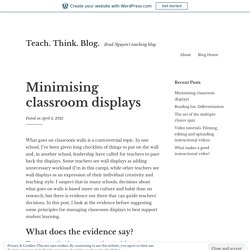
In one school, I’ve been given long checklists of things to put on the wall and, in another school, leadership have called for teachers to pare back the displays. Some teachers see wall displays as adding unnecessary workload (I’m in this camp), while other teachers see wall displays as an expression of their individual creativity and teaching style. I suspect that in many schools, decisions about what goes on walls is based more on culture and habit than on research, but there is evidence out there that can guide teachers’ decisions. Rosenshine and why teacher effectiveness research still makes sense, but isn’t the full story. – education ruminations. Rosenshine’s (2012) principles of instruction are deservedly having a bit of a moment in education.
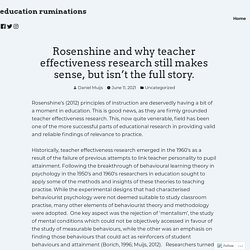
This is good news, as they are firmly grounded teacher effectiveness research. This, now quite venerable, field has been one of the more successful parts of educational research in providing valid and reliable findings of relevance to practice. Mr Goodwin. Proof Points: Gifted ed disappoints. By Jill Barshay The whole justification for gifted education is that some young children are so advanced that they need more challenging material to learn new things and stay motivated.
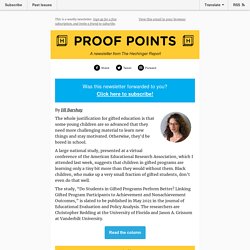
Otherwise, they’d be bored in school. A large national study, presented at a virtual conference of the American Educational Research Association, which I attended last week, suggests that children in gifted programs are learning only a tiny bit more than they would without them. Black children, who make up a very small fraction of gifted students, don’t even do that well. The study, “Do Students in Gifted Programs Perform Better? Our Brain Typically Overlooks This Brilliant Problem-Solving Strategy. For generations, the standard way to learn how to ride a bicycle was with training wheels or a tricycle.
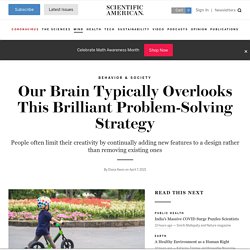
What’s your why? We have the structure – so the outcome will follow.
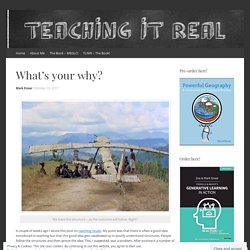
Right? New Kid. A few years ago, a new kid came to town.
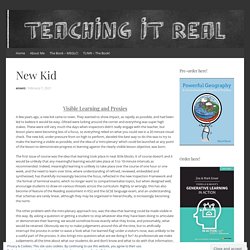
They wanted to show impact, as rapidly as possible, and had been led to believe it would be easy. Ofsted were lurking around the corner and everything was super high stakes. These were still very much the days when inspectors didn’t really engage with the teacher, but lesson plans were becoming less of a focus, so everything relied on what you could see in a 20 minute visual check. The new kid, under pressure from on high to perform, decided the best way to do this was to try to make the learning a visible as possible, and the idea of a ‘mini-plenary’ which could be launched at any point of the lesson to demonstrate progress in learning against the clearly visible lesson objective, was born.
The first issue of course was the idea that learning took place in neat little blocks. The other problem with the mini-plenary approach too, was the idea that learning could be made visible in this way. Using the science of mental models in my classroom. This alignment has led to a more iterative format of discussion within my classroom, which demonstrates to students how what they’ve learned in the past can inform what they are learning now, and what they will go on to learn in the future.
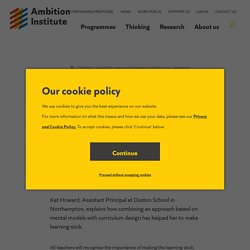
This approach is now in use outside of my classroom. It was used as an anchor for discussions with the current Head of English around how we ensure that the intended conceptual links mapped out at the time of design are then actualized within the classroom. When designing retrieval practice tasks, an approach completely embedded as part of our practice as a school, teachers can start to consider how they draw upon key vocabulary or ideas presented in previously-taught sections of the curriculum to better aid their delivery of the current content.
Looking forward, I would like to see how this method might be used within other subjects, where appropriate, to truly be effective in making connections across the curricular journey. Jean Piaget's Theory and Stages of Cognitive Development. Background and Key Concepts of Piaget's Theory By Dr. Saul McLeod, updated December 07, 2020 Jean Piaget's theory of cognitive development suggests that intelligence changes as children grow. A child's cognitive development is not just about acquiring knowledge, the child has to develop or construct a mental model of the world. Love To Teach – Research and Resources for every classroom. eCPD – recommendations for maths teachers while working from home – Teach innovate reflect. Amidst the current situation in maths departments in the country and working from home, I thought it would be useful to curate some maths specific CPD that staff could maybe look at to break up the working from home day with other jobs that may have been delegated.
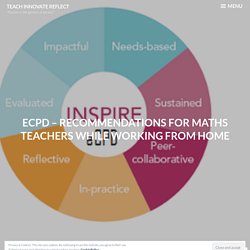
I’ve tried to go for a variety of topics and authors. It may be best to direct different staff to different sources and then ask them to come back and discuss, summarise, share ideas and put an implementation plan together. Firstly, I designed some infographics that are created using Oli Caviglioli’s principles: Positive writing 'cuts maths disadvantage gap' Giving pupils time out to write about the things that are important to them can improve the maths performance of disadvantaged pupils by giving them a psychological boost, new research suggests.
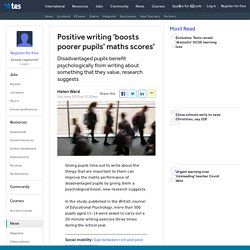
In the study, published in the British Journal of Educational Psychology, more than 500 pupils aged 11-14 were asked to carry out a 20-minute writing exercise three times during the school year. Social mobility: Gap between rich and poor pupils ‘stagnating’
Research: How to turn students' wishes into action. New research suggests a relatively simple technique could have teachers WOOPing at their students’ achievements, says Harry Fletcher-Wood We usually want students to do something differently, whether it’s working harder in lessons, doing homework more regularly, or being nicer to a peer.
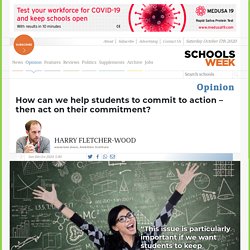
To get students from feeling broadly positive about an idea to actually acting on it, we need them to commit to the action – really commit to it – and then we need to help them make, and act upon, a concrete plan to achieve it. This issue is particularly important if we want students to keep learning independently – while self-isolating, for example. In a past Schools Week research review, Stuart Kime highlighted the value of setting clear goals and making plans for how to achieve them. Recently, researchers have been fine-tuning this approach, and the result seems tailor-made to get students started. The children in the primary school study were told this process was called a “Woop” Lessons Learned from a Chalkboard: Slow and Steady Technology Integration (Bradley Emerling) – Larry Cuban on School Reform and Classroom Practice. Bradley Emerling is Principal Research Scientist at Pearson Research and Innovation Network.
This commentary appeared in Teachers College Record on April 13, 2015. Last winter, while observing and recording classroom lessons for a research project in Japan, I was surprised to hear a sound I had not heard for many years—the sound of chalk. The Educational Intelligent Economy – Lifelong Learning – A vision for the future - CORE Reader. How Teachers Evolve Their Formative Assessment Practices When Digital Tools Are Involved in the Classroom. In this section, we present our analysis of three lessons observed during the school year.
We consider them as short but significant episodes in the development of the project: at the beginning of the year (in November 2014), in the middle of the year (in February 2015) and at the end of the year (in April 2015). The first occasion of analysis is based on an observation that took place in November, 2014, at the very beginning of the use of tablets in the classroom. The observed mathematics lesson was about the geometry of the circle. The teacher tested the student response system for the first time. The second occasion chosen for analysis comes from the observation of February, 2015. The analysis of these three observations is structured around the teacher’s orchestration choices. First Classroom Observation (November, 2014)
37 42 Transforming learning across the curriculum 1. Belleville School, London - Sugata Mitra visit. "I don't need to know everything; I just need to know where to find it when I need it. " By John Grove, Headteacher at Belleville Primary School On Monday the 12th of October, Professor Sugata Mitra made his third visit to Belleville Primary School, based in Clapham, London. Connecting Through Content - Teach Like a Champion. You’ve probably seen some version of this aphorism if you work in education: They Don’t Care How Much You Know Until They Know How Much You Care It’s s often given a sort of hallowed stature-it’s a truism & should shape our every decision in the classroom. Maybe that’s why it’s attributed to Teddy Roosevelt And John C. About - CfEY. Speaking and writing.
Habits. Metacognition. Modelling. Bite-size CPD. Rosenshine. Teach like a champion. Effective interventions. How does autonomy relate to job satisfaction and retention in teaching? Tips for effective teaching if you have to teach at a distance - KirschnerEd. This blog is based on the book ‘Lessons for Learning’, a translation of a recent Dutch language book, which should be coming out before the summer. The book is a collaboration between Tim Surma, Kristel Vanhoyweghen, Dominique Sluijsmans, Gino Camp, Daniel Muijs, and myself. Because of the Corona pandemic, we’re all going through a period that none of us have ever experienced. With respect to teaching and learning, kids can’t attend school and we must help them learn at home.
And this might last weeks or months. Fortunately, online education offers a solution, but the instructional techniques involved are not (completely) the same as what we do in the classroom during face-to-face education. Moodle. ‘Quality First Teaching’ (QFT) has become one of those phrases that everybody uses, but not everyone agrees on how to define it. Useful bits and pieces for evidence informed teaching.
Below is a list of things I have read and found interesting and have helped me develop as a teacher. 6 strategies for supercharging classroom motivation. Developing Practice Through Teacher Inquiry Groups. The five forms of feedback I give to teachers most often… Building a curriculum with firm foundations. Something that has always bemused me is the opposition that arises whenever it is suggested that what children learn in the foundation stage should prepare them to be ready for year one. Clear Teacher Explanations I: examples & non-examples.
The phrase “too much teacher talk” scrawled across lesson observation forms seems to be on the decline (at least, according to my Twitter feed). Insights from Direct Instruction part 1 – TomNeedham. I have been teaching DI schemes for a couple of years now, having first been made aware of Engelmann’s work via Joe Kirby’s blog post which gives an excellent overview of the theory, approach and research base that supports it. How self-regulation boosts pupil achievement. Clark. Dr Differentiation or: How I Learned To Stop Worrying and Love The Challenge – The Teaching Booth. TheEarlyCatastrophe. Is effortless learning possible? Giving students more music, theater, and dance boosts writing scores (and compassion), big new study finds. What Should Adults Be Doing When Children Are Working? Social mobility requires far more than a good education. Marginal Learning Losses. Inducing Self-Explanation: a Meta-Analysis. Lightbulb moments for teachers: threshold concepts in teacher education.
Why do children read more? The influence of reading ability on voluntary reading practices - Bergen - 2018 - Journal of Child Psychology and Psychiatry. Classroom ‘Direct Instruction’ Part II – Input – Sam Hall. The Emerging Consensus. Acrobat Document. To address underachieving groups, teach everyone better.
Gripped by the script. Graham Nuthall, The Most Important Education Researcher We Never Heard Of. Graphic Organisers by Roy_Huggins - Teaching Resources - Tes. Recommended Educational Research Papers for Teachers to Read on Mr Barton Maths. Reading Archives - Page 4 of 16 - Best Evidence in Brief. Dylan Wiliam Presentations. WIN! 'The Teacher Tapp CPD Canon' for your school's library - Teacher Tapp. UCPS-Curriculum-Design-Statement.
Reducing workload and maximising progress… – Midland Knowledge Hub. John Hattie is Wrong – Robert Slavin's Blog. Login - Dropbox. Learning: What is it, and how might we catalyse it? Peps Mccrea. Hirsch vs Engelmann: “No scientific basis for Direct Instruction”? Improving our subject knowledge. Are 'Learning Styles' Real? How I Rewired My Brain to Become Fluent in Math - Issue 17: Big Bangs. Setting up a Knowledge-rich School…. Part II – Midland Knowledge Hub. Differences in exam performance between pupils attending selective and non-selective schools mirror the genetic differences between them. Research in education is great…until you start to try and use it. Durrington Research School. 15 myths about memory and learning. Ofsted boss calls for teachers to prove subject knowledge.
Why schools should not teach general critical-thinking skills. Putting Evidence to Work - A School’s Guide to Implementation. Acrobat Document. Seating students for engagement – what does (some of) the evidence say? – How then should we teach? Kennedy-10 ER attribution. Ideas Generation and Behavioural Insights. Why did a small, badly designed experiment make me change my teaching forever? – Walden Education. KS2 KS3 Maths Guidance 2017.
Some Good News for Group Work? Why does sharing learning intentions matter? Blog: Using a painting to start an inquiry. The real way to instill a love of learning. Another poorly-conceived EEF study? 10 Tricky Questions for Teachers.